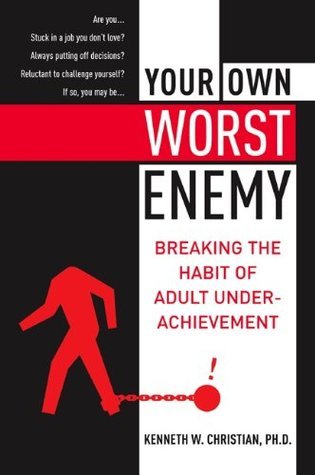What do you think?
Rate this book


316 pages, Kindle Edition
First published October 1, 2002
In a section of the book called "Defining Moments" the author writes:
"Besides death and birth, the onset of adult life surely qualifies as the big enchilada of all defining moments. Whatever else adulthood may represent, it signals the completion of the long apprenticeship, the end of the process of preparing to face the world on your own. Now it's time to make good on all that preparation." That's what this book is about. Another defining element would be the book's subtitle: Breaking The Habit of Adult Underachievement.
The author knows what he's talking about. Whip smart. Insightful. I'm sure a lot of us feel like we're not getting the most out of ourselves. This book teaches you how to turn that corner and hit on all cylinders.
The insights are painful sometimes. In that they just hit almost too close to home. I remember once I'd lost 35 pounds in a hurry. I'd just cut back on calories and exercised more. I remember being at a wedding where I saw a lot of people I hadn't seen in months. So many of those people came up to me and asked how I'd lost the weight. When I told them 'eating less and exercising' their faces fell. It didn't take long to realize they wanted to hear about some easy "miracle" diet or exotic pill that would allow them to lose weight without effort. The notion of having to work at it made their brains go dead because they didn't want to work at it.
Compare that notion with the author's. He writes:
"For change to occur, you must take action. Holding external forces responsible for what has gone wrong only keeps you stuck. Your personal involvement in making change is inevitable and required. If you decide that change demands that you assume too much responsibility for your own behavior and that you don't want or need to behave so responsibly, you will not change."
He writes of 'knowing how to finish' and order:
"The things we allow to trail along behind us ride up in front of us later and obstruct our road."
About responsibility:
"Though it can be momentarily appealing to evade responsibility, doing so always costs you heavily. When you reduce personal responsibility, you reduce personal power and control and engender passivity....Rather than looking for ways to reduce responsibility, look for ways to embrace it and increase it."
About time:
"How you spend your time defines your existence. That does not mean that you have to hoard it. You can be generous with it. But when you give time, you give up a piece of your life."
So I'm giving up a piece of my life to write this review. :) But I'm writing it in hopes it might help someone, and for that matter, I know I've already achieved my hopes because it's helping me!
Check the book out. Google it. Wikipedia. Amazon. What have you. It's good. It's really good.